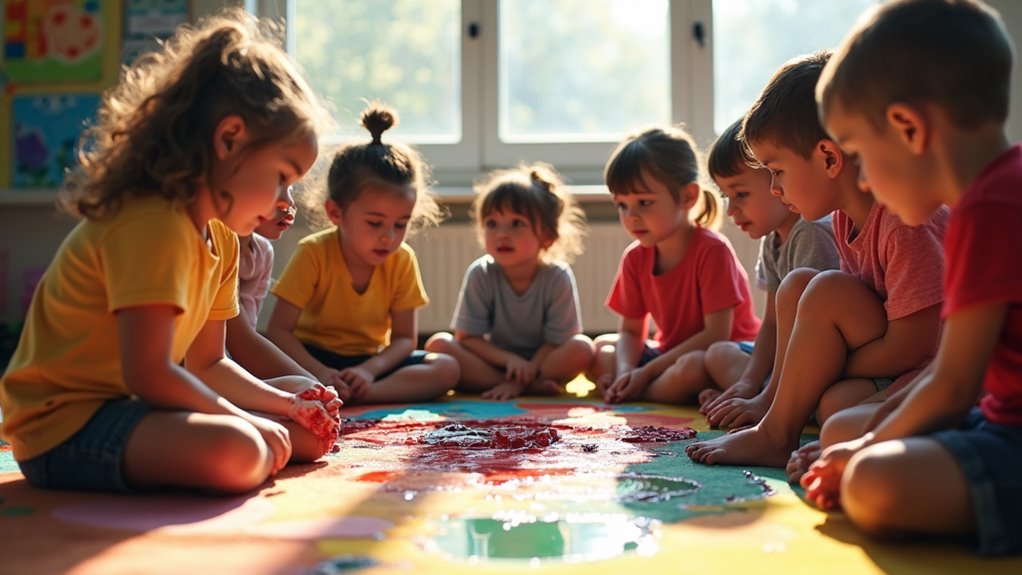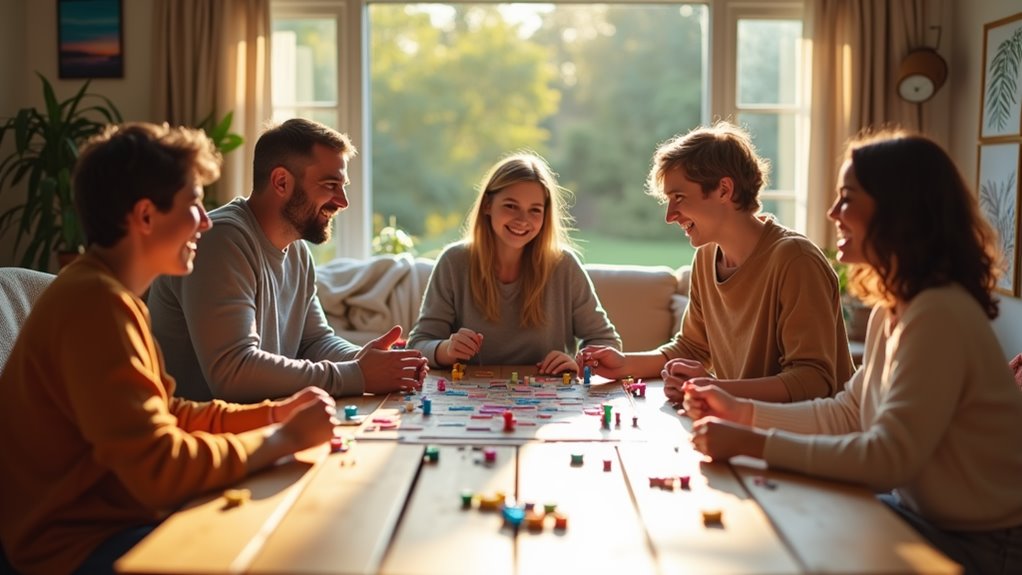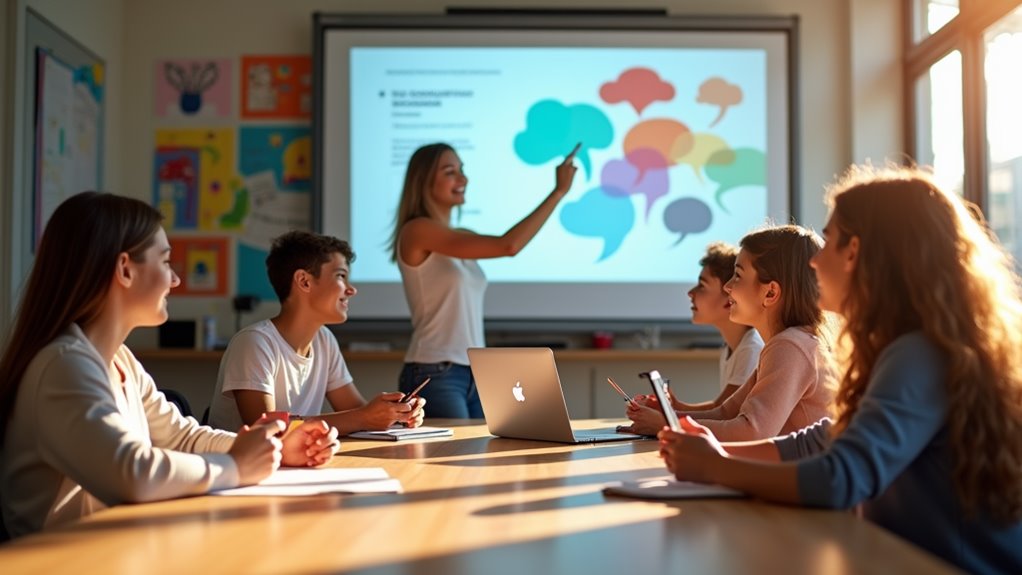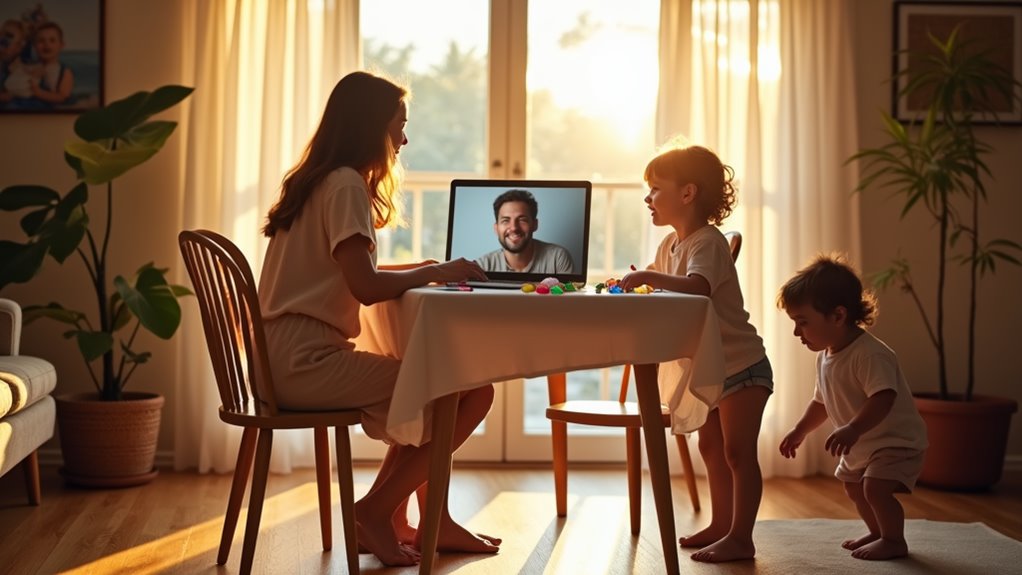Teaching kids about accountability through consequences is super important! When you help them see that every choice they make has a ripple effect, they start to understand responsibility. For younger kids, using fun stories or role-playing can really drive this home, while pre-teens are ready for discussions about how their actions affect others. Let them face natural consequences, like being hungry if they forget lunch, so they learn from real experiences. Plus, celebrating their good choices boosts confidence. It's all about turning mistakes into teachable moments—kind of like a fun puzzle to solve! Stick around to uncover more tips on this journey!
Understanding Accountability
Accountability is like a compass that helps kids navigate their responsibilities and choices. When you think about it, being accountable means owning up to what you do, whether it's completing homework or helping out at home. It's about recognizing that your actions affect not just you, but also those around you.
Imagine being part of a team, where everyone counts on each other to do their part. If you forget to pass the ball, your team might lose the game. Yikes, right?
Understanding accountability also means knowing that mistakes happen. Nobody's perfect, and sometimes you might mess up. That's totally okay! What really matters is how you respond. Do you shrug it off, or do you step up, admit what happened, and try to make it right?
When you take responsibility, you're not just building trust with others; you're also boosting your own confidence.
Think of accountability as a superpower. It helps you learn from your experiences, grow as a person, and become someone others can rely on.
Importance of Consequences
When you make a choice, you also create a ripple effect with consequences that follow. Think about it: when you decide to skip your homework, you might end up with a low grade. Yikes!
Consequences aren't always bad, though. They can teach valuable lessons and help you grow.
When you experience the results of your actions, you begin to understand responsibility. This helps you think twice before making decisions in the future. For example, if you choose to be kind to a classmate, you might make a new friend. That's a positive consequence!
Consequences also help you learn about cause and effect. If you eat all the cookies before dinner, you might find yourself hungry later. This simple act shows you that every choice has a result.
Age-Appropriate Strategies
Understanding the consequences of your actions sets the stage for learning about accountability, and it's important to approach this topic in ways that fit different ages. For younger kids, keep things simple and straightforward. You might use stories or role-playing to show how choices lead to outcomes. For example, if your child forgets their lunch, you can talk about how that affects their day.
As they grow, you can shift to more complex discussions. Pre-teens can handle conversations about how their actions impact others. Encourage them to think about how a friend might feel if they're left out or how a late homework assignment affects their grades.
Teens, on the other hand, are ready for deeper reflections. You can discuss real-world consequences, like how their choices can affect their future, such as college or job opportunities.
No matter their age, always keep the lines of communication open. Ask questions, listen to their thoughts, and be patient.
Add a sprinkle of humor when you can, like joking about how forgetting your shoes to gym class can lead to some funny situations, while still making your point. It'll make the lessons stick!
Natural Consequences
Natural consequences offer an effective way for kids to grasp accountability through real-life experiences. When you allow your child to face the results of their actions, they learn valuable lessons about responsibility.
For instance, if your child forgets their lunch at home, they might experience hunger at school. This isn't just a minor inconvenience; it's a chance for them to understand that forgetting comes with consequences.
Imagine your child decides to play outside instead of finishing their homework. If they get a bad grade because they didn't complete it, they'll realize that their choices directly affect their performance. It's not about punishment; it's about learning!
Of course, some natural consequences can be tough. You wouldn't want to let them touch a hot stove just to learn it's hot!
Instead, focus on everyday choices where the stakes aren't too high. By doing this, you're helping them become more aware of their decisions and encouraging them to think before acting.
Logical Consequences
Often, kids can grasp accountability more effectively through logical consequences that are directly tied to their actions. These consequences help children see the connection between what they do and what happens next. For example, if your child forgets their lunch at home, a logical consequence could be that they go without lunch or have to eat a school-provided meal. This shows them that forgetting has real effects.
It's important to make these consequences fair and related to the behavior. If they leave their bike out in the rain, a logical result might be that they can't ride it until it dries out. This helps them understand the importance of taking care of their things.
While it might be tempting to jump in and rescue them, letting them face these consequences teaches valuable lessons. Sure, it might feel tough to watch them struggle a bit, but it's all part of learning.
Plus, it can spark some funny moments too! You might even find yourself chuckling when they realize, "Oops, I should've brought my lunch!" This way, accountability becomes a fun, teachable moment instead of a chore!
Setting Clear Expectations
Setting clear expectations is essential for teaching kids accountability. When you lay out what you expect, it helps kids understand their responsibilities. Think of it like handing them a map before a treasure hunt; without it, they might wander off course!
Start by explaining specific tasks or behaviors you want to see. For instance, if you want them to keep their room tidy, say, "I expect you to make your bed every morning and put your toys away before dinner." Clear and concise, right?
Use simple language and examples they can relate to. Kids need to know what success looks like. It's like how a coach teaches a play in basketball; they need to see the strategy to execute it well!
Don't forget to check in with them. Ask if they understand what you expect. If they're confused, clarify things. It's normal for kids to have questions—after all, they're still learning.
When your expectations are clear, kids feel more confident and are more likely to be accountable. They'll learn that meeting expectations isn't just about rules, but also about developing good habits for life.
And that's a treasure worth finding!
Consistency in Discipline
When you apply consistency in discipline, it creates a stable environment where kids know what to expect and how to behave. Imagine if every time you made a mistake, the consequences were different. You'd probably feel confused, right? That's why sticking to the same rules and consequences helps kids feel secure. They learn that actions have predictable results, which is a key part of accountability.
Consistency doesn't mean being strict all the time, though. It means being fair and reliable. For example, if you decide that breaking a rule means losing screen time, stick to that decision.
If you change the consequence each time, kids might think they can get away with things. Plus, when they know what's coming, they can learn from their mistakes without feeling lost.
Encouraging Open Communication
To foster accountability in kids, you need to encourage open communication, as it creates a safe space for them to express their feelings and thoughts.
When you chat with your child, make it clear that their opinions matter. Ask them how they feel about certain situations, and listen without interrupting. You might be surprised at what they share!
Sometimes, kids hold back because they fear judgment. So, keep the atmosphere light and relaxed. You can say things like, "Hey, I won't bite! Just tell me what's on your mind." This helps them open up.
If they know they can talk to you about anything, they're more likely to take responsibility for their actions.
Encouraging this kind of dialogue also helps them learn to express themselves clearly. When they feel comfortable sharing, they'll develop confidence in discussing their mistakes and owning up to them.
Teaching Problem-Solving Skills
Problem-solving skills are essential for kids as they navigate challenges in everyday life. When things don't go as planned, you want your kids to feel confident tackling those bumps in the road. Start by encouraging them to identify the problem. Ask, "What's the issue here?" This helps them see that every challenge has a name, which is the first step to solving it.
Next, brainstorm solutions together. You can say, "What do you think we can do about this?" Let them come up with ideas, no matter how silly they may sound. Sometimes, the craziest ideas lead to the best solutions!
Once they've got a few options, help them weigh the pros and cons. Ask questions like, "What's the best thing that could happen if we choose this solution?" This will help them think critically about their choices.
Finally, encourage them to take action. Remind them that it's okay to make mistakes; that's how we learn! After they've tried a solution, take some time to reflect on what worked and what didn't. This way, they'll become more confident problem solvers, ready to tackle whatever life throws their way!
Modeling Accountability
Modeling accountability for your kids is essential in shaping their understanding of responsibility. When you take ownership of your actions, whether it's admitting a mistake or completing a task, you're setting an example.
Kids learn by watching, so if they see you own up when you mess up, they'll understand that it's okay to be imperfect.
Imagine you forgot to pick up groceries and had to tell your family, "Oops! I messed up." Instead of making excuses, you can say, "Let's figure out a plan to fix this." By doing this, you show them that accountability isn't just about being perfect; it's about how you respond when things go wrong.
You can also share stories about your own experiences, like the time you didn't study for a test and had to face the consequences. Your honesty can spark conversations, teaching them that everyone makes mistakes.
Reinforcing Positive Behavior
Acknowledging when kids take responsibility for their actions is just as important as modeling accountability yourself. When your child makes a good choice or owns up to a mistake, celebrate it! This positive reinforcement helps them understand that being accountable isn't just about facing consequences; it's about being proud of their choices.
Try saying things like, "I'm really proud of you for admitting that!" or "You handled that situation so well!" These small affirmations boost their confidence and encourage them to keep making responsible decisions.
You might also consider giving them a special reward for their accountability. It doesn't have to be anything extravagant—maybe an extra hour of screen time or picking the family movie for movie night.
Reflecting on Experiences
Reflection is a powerful tool for growth, especially for kids learning about accountability. When you take a moment to think about your experiences, you can understand what went well and what didn't. This is where the magic happens!
By reflecting, you realize how your choices lead to certain outcomes. Did you study hard for that test and ace it? Great job! But if you forgot to turn in your project and missed points, it's a chance to learn.
To make reflection fun, try writing in a journal or chatting with a friend about your day. Ask yourself questions like, "What did I do right?" or "What could I improve?"
This way, you're not just thinking; you're actively learning. Plus, it's a little like being a detective, figuring out the mystery of your own actions!





